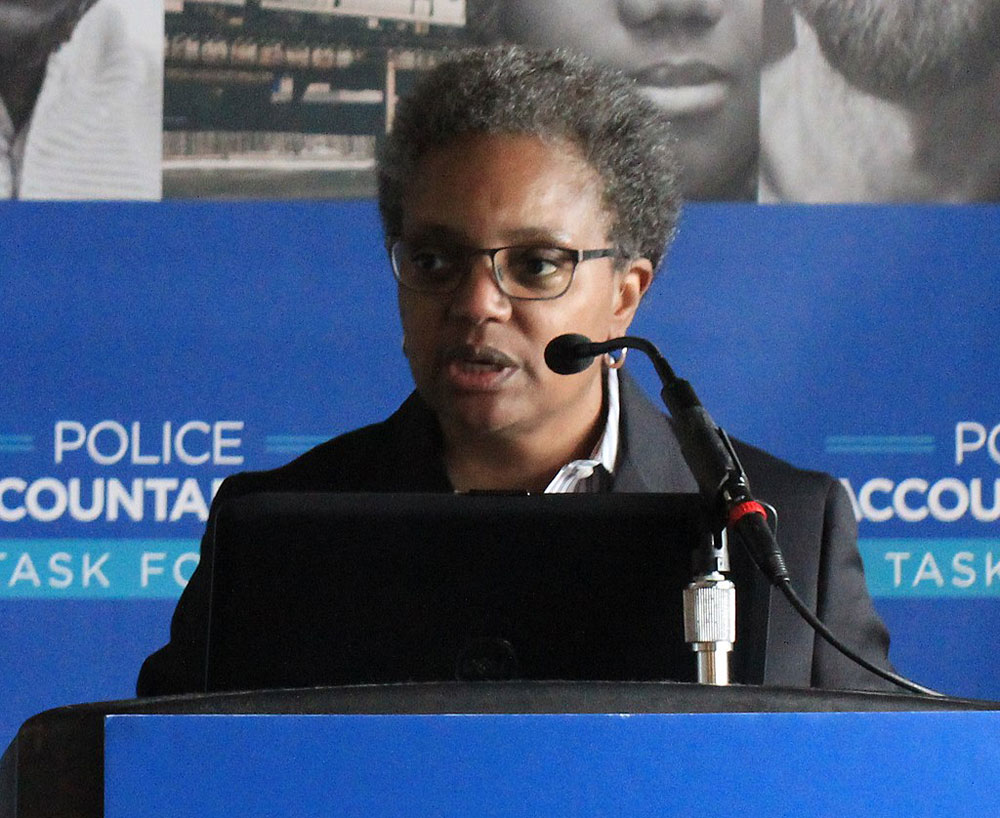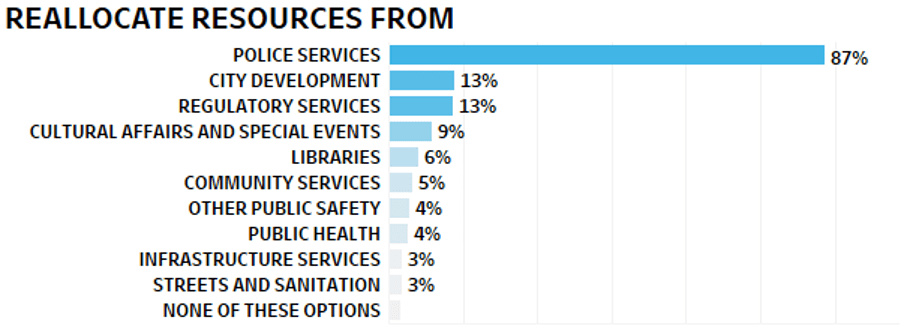
October 2, 2020; Block Club Chicago
The issue of “divesting” from police and investing in communities was clearly on the table when the results of a citywide survey were released by Chicago Mayor Lori Lightfoot’s office at a town hall meeting on September 30th. Nearly nine in 10 of the 37,679 respondents supported reallocating city resources away from the police, currently the largest portion of the city’s budget.
Alongside Budget Director Susie Park, Mayor Lightfoot now faces the hard task of presenting a balanced budget in the midst of an economic downturn due to the pandemic. In seeking community input, Chicago is, perhaps reflecting a national perspective on how the grassroots feel about funding communities and just where police and policing rank in that picture.
“All city areas ranked community services, including violence prevention, homeless support services, youth services as the highest priority with police services as the lowest,” Park says.
All of this should come as no surprise to the leadership of Chicago, or perhaps of any city with a police force consuming an outsized portion of the city budget. In September, Martin Levine explored the situation in Chicago for NPQ, looking at community organizations that responded to—and disrupted—what might have become violent responses with some success. “Central to the ability of Chicago and other cities to implement strategies beyond expanded policing,” he wrote, “is the power to shift resources from criminal justice to alternative community resources. Calls to defund, and even abolish, local police forces have resounded in the ongoing protests against police violence.” Now, with the community survey results, the voice of the people can truly be demonstrated. When 87 percent say they want to see funding reallocated, they targeted the police budget for the source of those funds.
The big question is whether Mayor Lightfoot will be responsive to this overwhelming data. Most likely, the answer is no. She has rejected calls to shift resources away from the police and called the movement to defund the police a “nice hashtag.” Up to this point, Lightfoot has said she believes most city residents want more resources for the police, not less. (The survey would seem to differ.) Still, she was deferential to those who came to her town hall—which this writer attended—and later said in a news conference, “We very much value the feedback we’ve gotten from a range of different sources, a survey being one of them. We are taking all of that into consideration, and we expect that a lot of feedback will be reflected in the budget that we present to City Council.”
Sign up for our free newsletters
Subscribe to NPQ's newsletters to have our top stories delivered directly to your inbox.
By signing up, you agree to our privacy policy and terms of use, and to receive messages from NPQ and our partners.
While the figures vary as you add in things like settlements for police misconduct and legal settlements, the 2020 budget for the Chicago Police tops out at $1.8 billion, the second-costliest police force in the country. This makes the police force one of the largest parts of the city budget. When asked why the city “prioritized” police over other parts of the budget, the mayor pushed back, somewhat defensively, saying, “We don’t prioritize funding for the police department over other necessary services that really build healthy and strong communities. We’ve made historic investments in mental health, in affordable housing, in homeless prevention and to the extent that we can continue to prioritize those and funding at the same level, we’re going to.”
The citizens who took the time to answer the survey told the mayor and the city council that they did not want increased revenue sources (74 percent “no”; 26 percent “yes”). Rather, they wanted reallocation of existing resources (88.5 percent in favor, 11.5 percent against). And then they told them just where they thought those resources should be reallocated from, as seen in the chart below.

All of this comes at a time when Chicago, like many cities, faces a huge budget gap for 2021 as well as a shortfall for the 2020 budget, much attributed to the impact of COVID-19. But when you look for places to cut the city’s budget, the most logical place is the police.
“That’s the only place where the money is,” Alderman Rossana Rodriguez-Sanchez says. “Most of the money is there, so to take money out of the library or public health, there’s no money there, they’re already down to the bone.” She points to multiple areas in the police budget that could be cut, such as training and overtime, and to the fact that the city is still struggling to meet the mandates of a federal consent decree.
Mayor Lightfoot recently rejected two competing plans for police reform, showing the kind of limbo where one finds a city where people are asking for change and not getting it. Getting the balance right seems to be the issue, as is making sure that as government allocates funding, it does so in a way where people and communities feel they are being heard. If government asks for input from the general public and the public responds, then it behooves them to take that input seriously. Otherwise, it places at risk any trust in government that may remain.—Carole Levine












